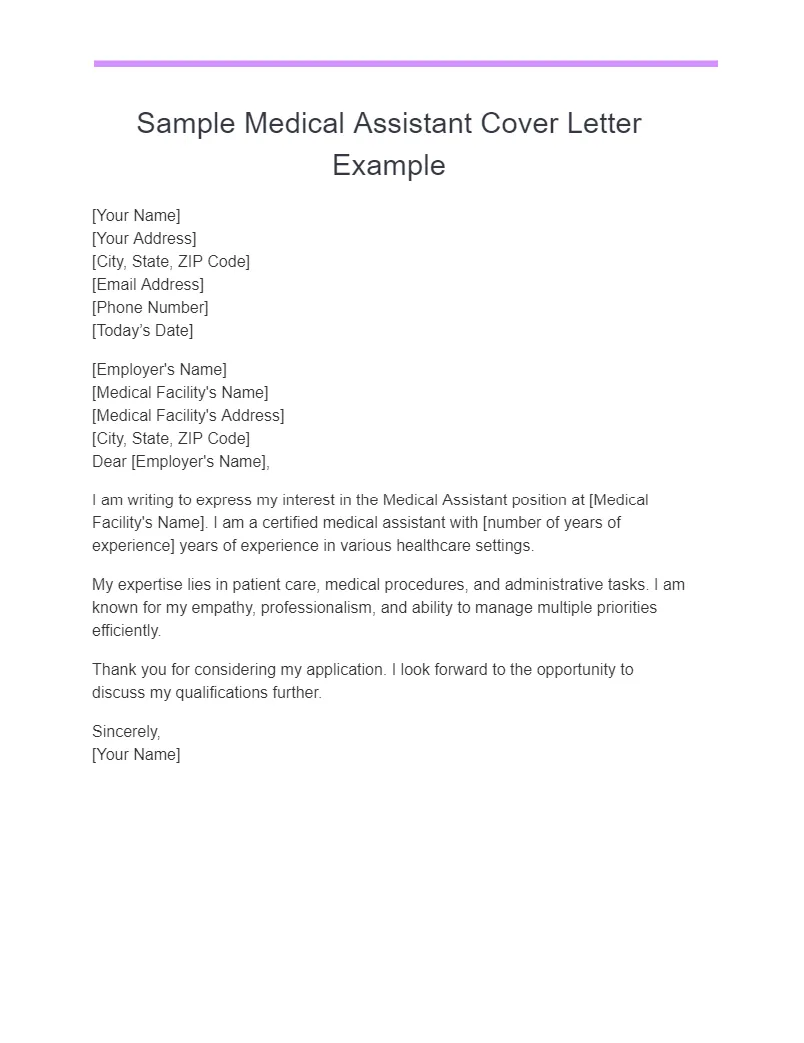Understanding the Medical Office Assistant Role
A medical office assistant plays a vital role in the smooth functioning of a healthcare facility. They are often the first point of contact for patients, providing administrative and clinical support to ensure efficient operations. This role demands a blend of organizational skills, communication proficiency, and a strong understanding of medical terminology and procedures. From managing patient records to scheduling appointments and handling insurance claims, a medical office assistant’s responsibilities are diverse and crucial to the healthcare team. Crafting a compelling cover letter is the first step in showcasing your qualifications and securing a position in this rewarding field.
Key Responsibilities of a Medical Office Assistant
The daily tasks of a medical office assistant are wide-ranging, encompassing both clinical and administrative duties. They often greet patients, answer phones, and manage appointment schedules. Administrative responsibilities include handling patient records, processing insurance claims, and managing billing. Clinical tasks might involve taking patient histories, recording vital signs, and preparing patients for examinations. These assistants must be adept at multitasking, maintaining confidentiality, and working collaboratively with physicians, nurses, and other healthcare professionals. Their ability to streamline processes directly impacts patient care and office efficiency.
Skills Required for the Position
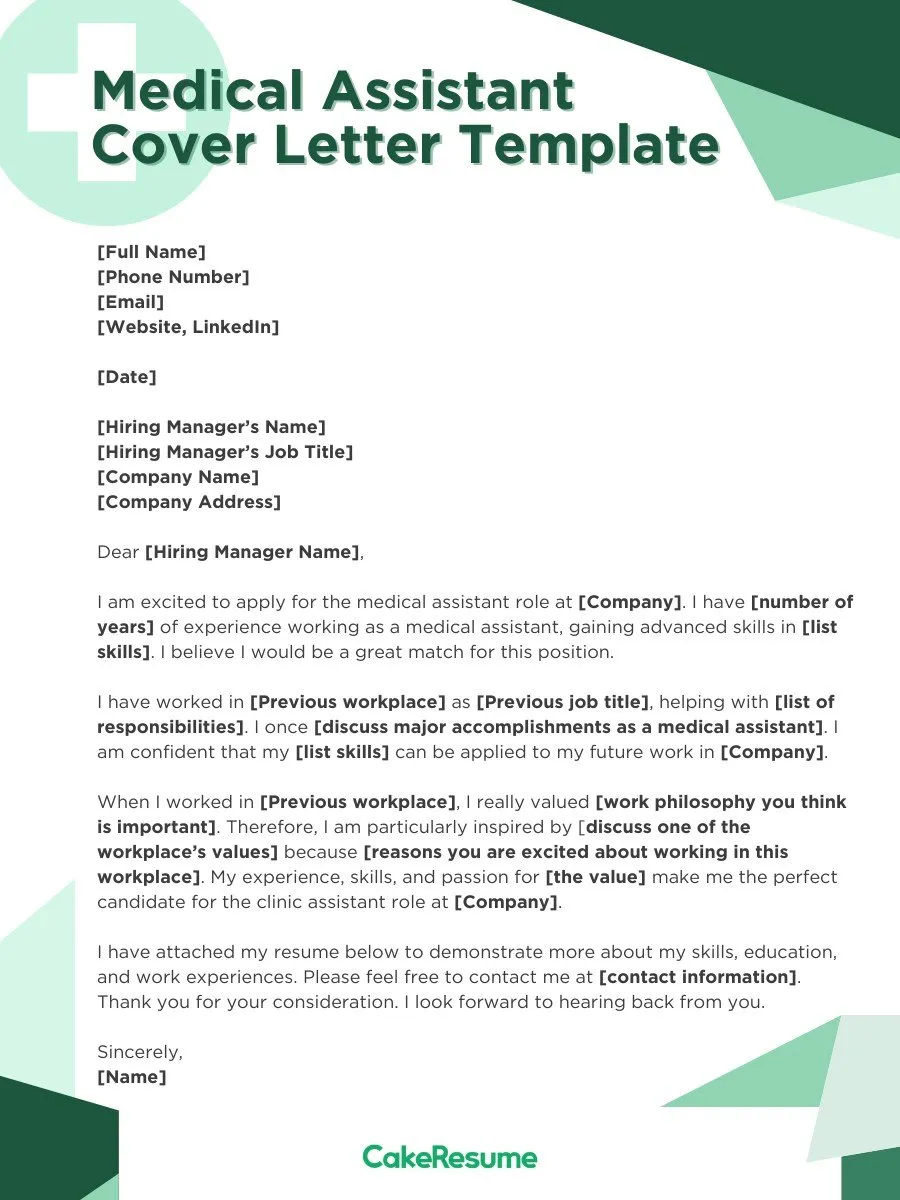
To excel as a medical office assistant, several essential skills are needed. Strong communication skills, both written and verbal, are critical for interacting with patients, physicians, and insurance companies. Proficiency in medical terminology, medical software (such as electronic health records - EHR systems), and basic clinical procedures is highly desirable. Attention to detail, organizational skills, and the ability to multitask are also crucial for managing patient records, scheduling appointments, and handling administrative tasks efficiently. Moreover, empathy, patience, and a professional demeanor are essential for providing excellent patient care. A well-crafted cover letter should highlight these skills and experiences.
Crafting Your Cover Letter
A well-written cover letter is your opportunity to make a strong first impression and demonstrate why you’re the ideal candidate for the medical office assistant position. The goal is to capture the hiring manager’s attention, showcase your relevant skills and experiences, and express your genuine interest in the role. Your cover letter should be tailored to the specific job description, emphasizing the qualifications that align with the employer’s requirements. By following a structured approach, you can create a compelling cover letter that sets you apart from other applicants and increases your chances of landing an interview.
Header and Contact Information
Start your cover letter with a professional header that includes your full name, contact information (phone number and email address), and the date. If you know the name of the hiring manager, include their name and title, along with the clinic’s or hospital’s address. This attention to detail demonstrates professionalism and shows that you’ve done your research. Ensuring that your contact information is accurate and easily accessible is crucial, allowing the hiring manager to contact you promptly if your application is successful.
Addressing the Hiring Manager
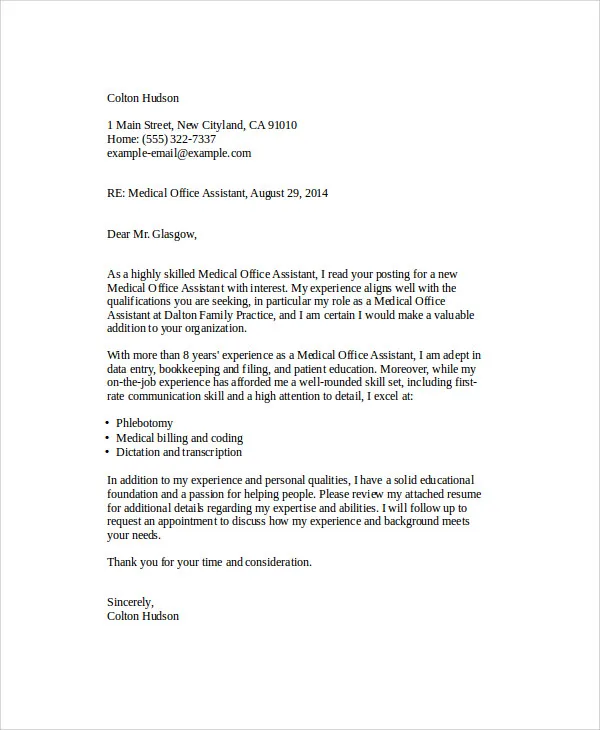
Always address the hiring manager by name if possible. Research the clinic or hospital to find the hiring manager’s name, or look for it in the job posting. Addressing the cover letter to a specific person makes it more personal and demonstrates your genuine interest in the position. If you cannot find a specific name, use a professional salutation, such as “Dear Hiring Manager,” or “Dear [Department Name] Team.” Avoid generic greetings like “To Whom It May Concern,” as they can make your cover letter seem less personalized.
Opening Paragraph Structure
The opening paragraph should immediately grab the hiring manager’s attention and state your purpose for writing. Start with a strong, engaging sentence that indicates your interest in the specific medical office assistant position. Briefly mention where you saw the job posting and why you are interested in the role and the healthcare facility. Express enthusiasm and highlight your understanding of the role. This initial paragraph should make the reader want to continue reading to learn more about your qualifications.
Highlighting Relevant Skills and Experience
The body of your cover letter is where you showcase your skills and experience. Use this section to demonstrate how your qualifications align with the job requirements outlined in the job description. Provide specific examples of your experience in handling patient records, scheduling appointments, managing insurance claims, and using medical software. Focus on your key achievements and skills, such as strong communication, organizational abilities, and proficiency in medical terminology. Use action verbs to describe your accomplishments and quantify your achievements whenever possible. Tailor the content to match the job description, highlighting the skills and experiences the employer is seeking.
Quantifying Achievements
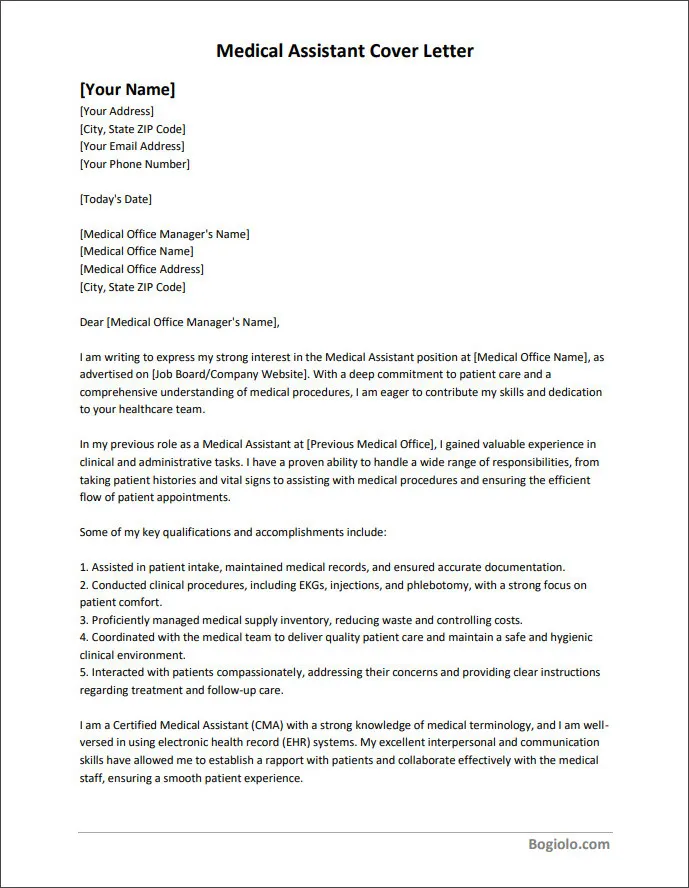
Whenever possible, quantify your achievements to demonstrate the impact you’ve made in previous roles. Use numbers to showcase your accomplishments. For example, instead of saying “Improved patient satisfaction,” state “Increased patient satisfaction scores by 15% through improved communication and efficient appointment scheduling.” This concrete evidence of your abilities will make your cover letter more compelling and demonstrate your value as a candidate. Quantifying achievements makes your claims more credible and memorable.
Tailoring Your Letter
Tailor your cover letter to each job application. Research the healthcare facility and the specific requirements of the medical office assistant position. Use keywords from the job description throughout your cover letter to show that you have the necessary skills and experience. Customizing your cover letter demonstrates that you’ve invested time and effort in the application process and that you’re genuinely interested in the opportunity. Avoid sending a generic cover letter to multiple employers; personalize each application to increase your chances of success.
Closing the Cover Letter
In the closing paragraph, reiterate your interest in the position and express your gratitude for the hiring manager’s time and consideration. Reiterate your enthusiasm for the opportunity and restate your key qualifications briefly. Include a call to action, such as stating that you are available for an interview and eager to discuss how your skills and experience can benefit the healthcare facility. Use a professional closing, such as “Sincerely” or “Respectfully,” followed by your typed name. Be sure to proofread the entire cover letter before submitting it.
Formatting and Proofreading
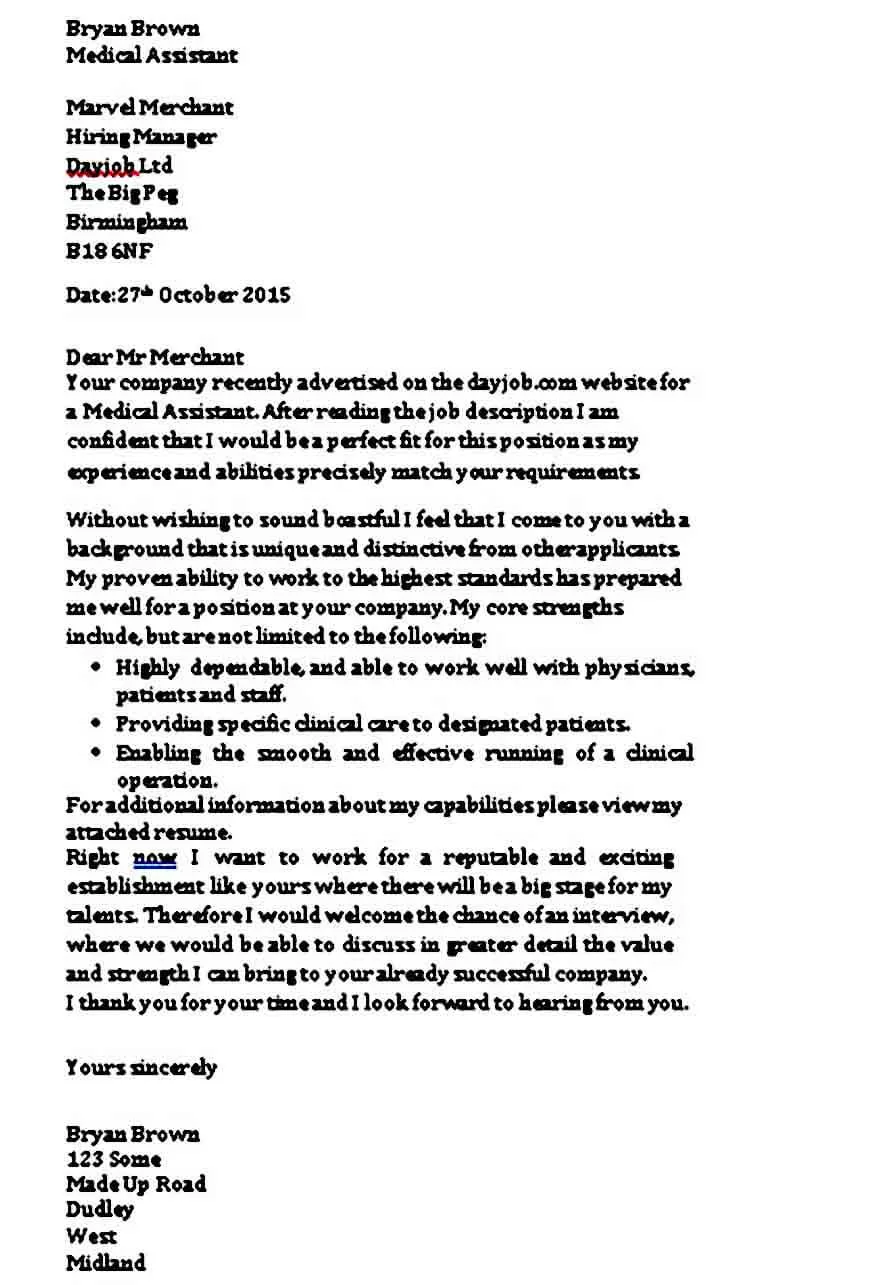
Attention to detail in formatting and proofreading is crucial for creating a professional cover letter. A well-formatted and error-free cover letter demonstrates your professionalism and attention to detail, qualities that are highly valued in the medical field. Proper formatting and meticulous proofreading can make a positive impression on hiring managers, showcasing your commitment to excellence and increasing your chances of getting noticed.
Choosing the Right Font and Format
Select a professional, easy-to-read font, such as Times New Roman, Arial, or Calibri. Use a font size between 10 and 12 points. Maintain consistent formatting throughout the cover letter, including consistent spacing, margins, and bullet points if applicable. Use a standard business letter format with justified or left-aligned text. Ensure the cover letter is easy to read and visually appealing. Save your cover letter as a PDF file to preserve the formatting and ensure it can be opened by any recipient. Proper formatting enhances readability and gives your cover letter a polished look.
Proofreading for Errors
Before submitting your cover letter, carefully proofread it for any errors in grammar, spelling, and punctuation. Even minor errors can undermine your credibility. Read the cover letter aloud to catch mistakes you might miss when reading silently. Consider having a friend or colleague review your cover letter for a fresh perspective. Pay close attention to the correct use of medical terminology and avoid any jargon that might not be understood by the reader. A well-proofread cover letter demonstrates attention to detail and professionalism.
Common Mistakes to Avoid
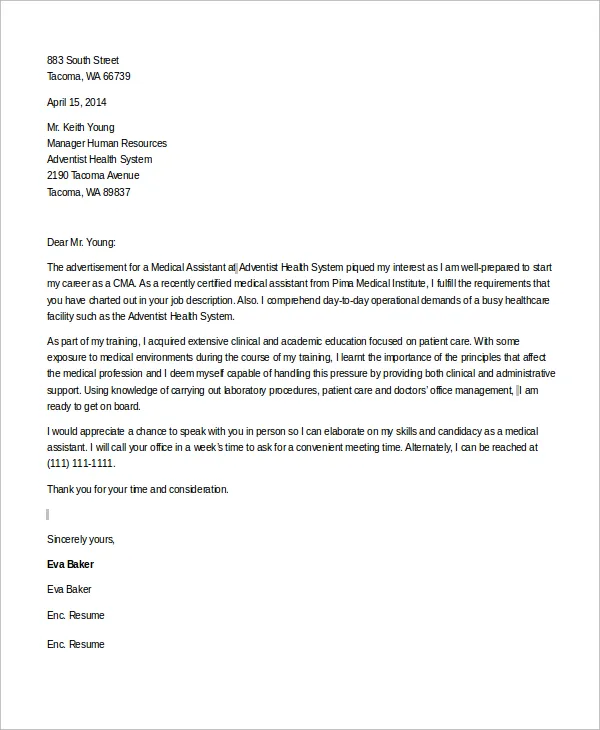
Several common mistakes can damage your chances of getting hired as a medical office assistant. By avoiding these pitfalls, you can significantly increase the effectiveness of your cover letter and make a positive impression on potential employers. Attention to detail, careful proofreading, and a thoughtful approach will help you stand out from the competition and showcase your qualifications. Understanding and avoiding these common mistakes will help you create a winning cover letter.
Generic Language
Avoid using generic language and clichés in your cover letter. Instead of using vague phrases like “hard worker” or “team player,” provide specific examples of how you’ve demonstrated those qualities in your previous roles. Avoid generic statements that could apply to any job. Use action verbs and specific details to showcase your skills and achievements. Replace generic statements with compelling narratives about your experiences. Tailor your language to the specific requirements of the job description.
Typos and Grammatical Errors
Typos and grammatical errors can create a negative impression, undermining your professionalism and attention to detail. Proofread your cover letter carefully before submitting it. Use spell-check and grammar-check tools, but do not rely solely on them; always review the document yourself. Read the cover letter aloud to catch any mistakes you might have missed. Having a friend or colleague proofread your letter can provide an additional layer of quality control. A well-proofread cover letter demonstrates that you are meticulous and care about the details.
Ignoring the Job Description
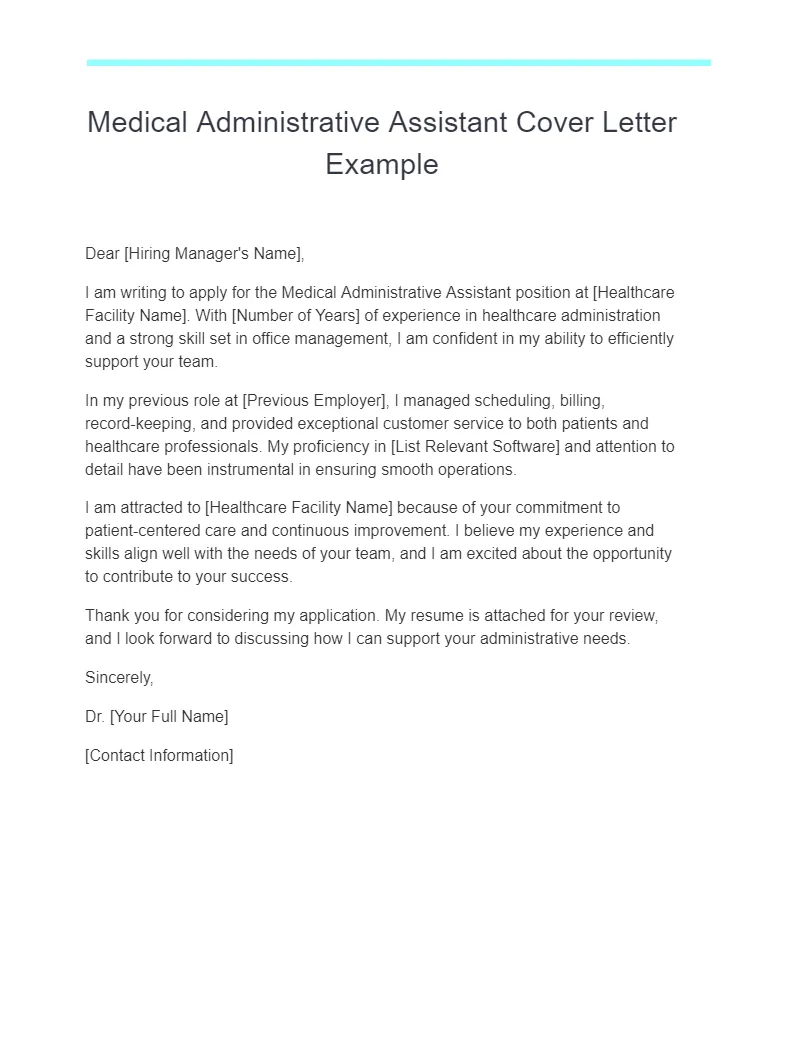
One of the biggest mistakes is failing to tailor your cover letter to the specific requirements of the job description. Carefully review the job posting and identify the key skills and qualifications the employer is seeking. Customize your cover letter to highlight your relevant experience and demonstrate how your skills align with their needs. Use keywords from the job description to show that you’ve read and understood the requirements. By tailoring your cover letter, you will demonstrate that you are a strong fit for the role and have taken the time to understand what the employer is looking for.
Examples of Effective Cover Letter Sections
Reviewing examples of effective cover letter sections can help you create a compelling cover letter. Studying successful examples can provide inspiration and guidance on how to structure your letter, highlight your qualifications, and make a strong impression on potential employers. Use these examples as a template to tailor your own cover letter, ensuring it effectively showcases your unique skills and experience. Here are some examples to guide you:
Example Opening Paragraphs
Here are a couple of examples of effective opening paragraphs:
Example 1: “I am writing to express my enthusiastic interest in the Medical Office Assistant position at [Clinic Name], as advertised on [Platform]. With five years of experience in a fast-paced medical environment, I am confident in my ability to provide exceptional administrative support and patient care. My strong organizational skills, proficiency in medical software, and dedication to accuracy align perfectly with the requirements of this role.”
Example 2: “I am excited to apply for the Medical Office Assistant position at [Hospital Name], as I am impressed by [Hospital Name]’s commitment to providing high-quality patient care. I possess a strong background in medical administration, patient communication, and insurance processing. My experience in a similar setting has equipped me with the skills necessary to thrive in this position and contribute to your team’s success.”
Skills and Experience Paragraph Examples
Here are a couple of examples of skills and experience paragraphs:
Example 1: “In my previous role at [Previous Clinic Name], I was responsible for managing patient records, scheduling appointments, and handling billing and insurance claims. I consistently maintained patient confidentiality and accuracy, successfully processing an average of 50 insurance claims per week. I am proficient in using [Specific Medical Software] and have excellent communication skills, enabling me to effectively interact with patients and healthcare professionals.”
Example 2: “During my internship at [Hospital Name], I gained valuable experience in assisting with patient intake, taking vital signs, and preparing patients for examinations. I demonstrated strong organizational skills by managing a high volume of patient files and ensuring accuracy in medical records. I also assisted with answering phone calls, managing schedules, and communicating with patients. I am passionate about the medical field and am eager to apply my skills to help your team.”
Closing Paragraph Example
Here is an example of an effective closing paragraph: “Thank you for considering my application. I am eager to learn more about the Medical Office Assistant position at [Clinic Name] and discuss how my skills and experience can contribute to your team. I am available for an interview at your earliest convenience and can be reached at [Phone Number] or [Email Address]. I look forward to the opportunity to speak with you soon.”
